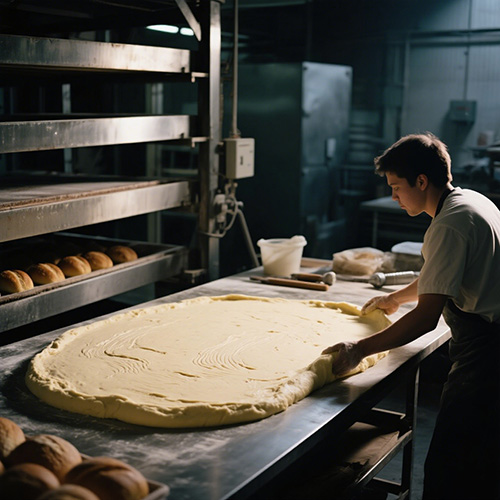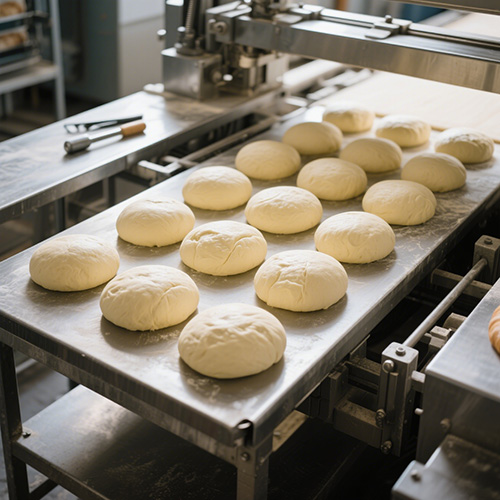



Have you ever wondered how top bakeries produce perfectly shaped loaves of bread, crisp croissants and even, consistent pastries day in and day out? The secret lies in the dough machines – innovative tools designed to streamline your baking process, improve efficiency and enhance product quality. Helping you achieve consistency, save time, and let your customers enjoy every delicious bite.
In this blog, we’ll dive into why a dough machine is a must-have for any bakery looking to expand, improve quality, or simply fulfill a need. From automation to precision, let’s explore how these machines can transform your operation.
Dough machines are specialized equipment designed to automate the process of mixing, kneading, and sometimes even shaping dough for baking. These machines help bakeries achieve consistent dough quality with minimal labor, which is especially crucial in high-volume operations. Let’s take a closer look at how dough machines can transform your bakery’s production:
One of the biggest challenges bakeries face is maintaining consistent dough texture and quality. Manual kneading can be imprecise, with the dough varying from batch to batch. With dough machines, bakeries can achieve uniform dough every time, ensuring that each product maintains the same texture, flavor, and appearance.
In busy bakeries, time is of the essence. Dough machines significantly speed up the mixing and kneading process, reducing the time spent on each batch. This means your bakery can produce more dough in less time, improving overall efficiency and allowing you to meet customer demand more easily.
Manual dough production requires skilled labor, and often multiple workers are needed for different stages of the process. By investing in dough machines, bakeries can automate much of the labor-intensive work, freeing up employees to focus on other tasks and reducing the overall need for skilled labor.
Different types of dough—whether for bread, pizza, or pastries—require different handling and mixing techniques. Many dough machines are equipped with adjustable settings that allow bakeries to customize the dough-making process to suit their specific needs. This ensures that you can create a wide range of baked goods with consistent results.
Manual dough production can be messy, and it may be challenging to maintain proper hygiene. Dough machines are designed for easy cleaning, helping you maintain a sanitary environment that meets food safety regulations. This not only improves the quality of your products but also reduces the risk of contamination.
Not all dough machines are created equal. Depending on the scale of your bakery and the variety of baked goods you offer, you may need different types of dough machine. Below, we’ll compare a few key types and their uses.
| Dough Machine Type | Ideal for | Main Feature |
|---|---|---|
| Spiral Dough Mixer | Bread, pizza dough, and more | High-speed, efficient mixing |
| Planetary Mixer | Cakes, pastries, and soft doughs | Versatile, multiple attachments |
| Horizontal Dough Mixer | Large-scale production | Uniform mixing for heavy doughs |
| Dough Divider & Rounder | Precise portioning for rolls and buns | Divides dough into equal portions |
| Dough Sheeter | Thin dough for pizza and croissants | Consistent sheet thickness |
These machines can be customized to suit your specific needs, ensuring that you achieve the best possible dough quality for your baked goods.
Investing in dough machines not only enhances your production efficiency but also directly impacts your bakery’s bottom line. Here’s how:
Manual processes often lead to inconsistent results, which can lead to waste. Dough machines help minimize this by providing consistent mixing and portioning, ensuring that less dough is wasted during production.
With automation, bakeries can produce a higher volume of dough with fewer workers. This allows bakeries to focus on growing their business without constantly needing to hire and train additional staff.
Higher-quality dough results in better products, which can improve customer satisfaction and lead to more repeat business. When customers know they can count on consistent, high-quality baked goods, they are more likely to become loyal patrons.
You might be wondering if dough machines are worth the cost. The answer? Absolutely. While the upfront investment varies, the long-term savings are undeniable. Reduced labor, less waste, and higher output mean faster returns. Plus, many machines are designed for durability, lasting years with proper maintenance. For small bakeries, compact models offer affordable entry points without compromising performance.
Some bakers worry that dough machines are only for large-scale operations. Not true. Many machines, like tabletop mixers or compact dividers, are designed for small to medium batches, making them ideal for boutique bakeries. Adjustable settings let you scale up or down, so you’re not locked into industrial-level production.
Worried about complicated upkeep? Modern dough machines are user-friendly, with intuitive controls and easy-to-clean designs. Regular maintenance, like cleaning and periodic checks, keeps them running smoothly. Most manufacturers provide detailed guides, and some offer training to ensure your team is confident using the equipment.
If you want to take your bakery to the next level in terms of efficiency, consistency, and profitability, investing in dough machines is a no-brainer. These machines streamline your production process, reduce labor costs, and ensure that your baked goods are of the highest quality—every single time. As a leader in the bakery equipment industry, Chengwo specializes in providing cutting-edge dough machines tailored to the specific needs of bakeries.
Don’t let outdated equipment hold you back—contact us today to learn how we can help optimize your production line and increase your bakery’s success.
Why should I switch to dough machines in my bakery?
Switching to dough machine increases efficiency, improves dough consistency, and reduces the need for manual labor. These machines also help you scale up your production without compromising quality.
Can dough machines handle different types of dough?
Yes, most dough machine are versatile and can be adjusted to work with various types of dough, from pizza dough to pastry dough and more.
How do dough machine improve the hygiene of my bakery?
Dough machine are designed to be easy to clean, reducing the risk of contamination and helping you maintain a sanitary environment in your bakery.
Are dough machine easy to maintain?
Yes, most dough machine are designed for easy maintenance. They are typically equipped with features that allow for quick disassembly and cleaning, making them simple to maintain in a busy bakery setting.

